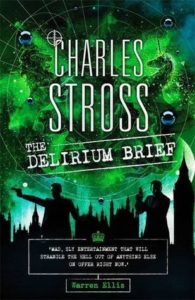The Delirium Brief, the eighth book in Charles Stross’ Laundry series, returns Bob Howard, the series’ main protagonist, to center stage. As you know, Bob had been out of the spotlight for most of the last two books — The Nightmare Stacks and The Annihilation Score — for various plot and structural reasons.
The Laundry series began as a mash-up of British spy thrillers, Lovecraftian horror, and The Office (UK, of course). In the books’ world, certain branches of advanced mathematics produce effects that are topologically equivalent to magic, bending space and dimensions in unusual ways, opening portals to worlds beyond usual notions of time and space, and, annoyingly enough, attracting the attention of unearthly beings that like nothing better than to feast on conscious minds. If that weren’t worrying enough, the effects of bending space are cumulative, so that ruptures in the fabric of reality become easier the more they are performed. And if that weren’t worrying enough, computational power plays a role as well; the more computations are undertaken, the more the other effects of mathematical magic are magnified. With hundreds of millions of people walking around in the early 21st century with enough computing power in their pockets to have driven the Apollo program 50 years previous, it’s clear which way the feedback loops are spinning.
The Laundry was a secret arm of British intelligence devoted to cleaning up supernatural threats, hence the name. In The Nightmare Stacks, one of those supernatural threats invaded England, leading to airborne battles between jet fighters and, not to put too fine a point on it, dragons, to say nothing of pitched battles that left much of downtown Leeds a smoking ruin. The Laundry is obviously no longer secret. In fact, The Delirium Brief opens with a designated person from the Laundry going on the BBC’s most famous news program to try to explain what happened. Bob, who was conveniently out of the country when the events too place, finds himself nominated.
“Let me tell you a bit about myself. As I said, I’m Bob Howard, age 39, position: DSS Grade 1, that’s short for Detached Senior Scientist or Deeply Scary Sorcerer or something, nobody really cares (in the Laundry they’re more or less the same thing), and my life sucks right now.” (p. 9)
Bob would still like to think of himself as a slacker mathematician with a weird job and an occasional sideline in interdimensional skulduggery. But fifteen years into the agency, he’s a senior figure. He’s management, and he’s the human front for a monstrous entity that eats souls. He’s also terribly unhappy that he is about to become the face of the agency, by way of being grilled on national television.
“But one final question for you: can you explain to the viewers why you are reportedly known to other members of your agency as the ‘Eater of Souls’?”
For a moment I see red: blood spattered all up and down the blue-screen back wall of the studio. But no, that would be bad, and worse, it would be unprofessional. Also, the ward he’s wearing under his shirt collar is powerful enough that I could break it, but I’d probably set fire to his hair in the process. It would look bad on camera. And also-also—I suddenly realize this is the wrap-up question. I get the last word in so I can select what to give him.
I summon up a sheepish smirk: “When I was junior, I used to put my foot in my mouth rather a lot. The nickname stuck.” (p. 16)
The ward on the television host is a sign of several things, none of them good for Bob or the Laundry. It’s a sign that they are fighting not only the feedback loops pointing toward apocalyptic singularity, not only multiple menaces from beyond the stars, but most certainly other factions within Her Majesty’s government. That last may be the deadliest, because when all is said and done the Laundry is a public agency, established by the customary law of the land and duly constituted to defend the realm. But what if the Crown’s ministers are themselves subverted?
That’s the thorniest issue of The Delirium Brief, a book that is much more inwardly focused than either of its two immediate predecessors. It’s fast and furious, and it’s got funny bits, too like this description of Bob’s time before a committee of Parliament:
“My interrogator is the Right Honorable Lord Swiveleyes of Stow-on-the-Wold, a retired Big Cheese from MI5 who is eking out his political afterlife in the Lords.” (p. 111)
It’s good to have Bob back, and it’s interesting to see him step up into a bigger role. On the whole, though, The Delirium Brief feels a bit like a bridge book, or a breather after the large-scale fireworks of The Nightmare Stacks. The main villains have appeared before, and I was a bit uneasy at their portrayal. I thought that Stross comes close to heavy-handed caricature in his portrayal of televangelists from Colorado Springs, that they’re not as convincing as they were the first time around, and thus not good menaces for Bob and his allies in the Laundry.
By the end, the world has unraveled even further, although not as visibly as happened in The Nightmare Stacks. As the eighth in the series, The Delirium Brief is not a good place to start; begin at the beginning. The ninth book, The Labyrinth Index, will likely be published in 2019, though it is no longer clear that that will be the last one. This apocalypse is too much fun to finish too soon!

